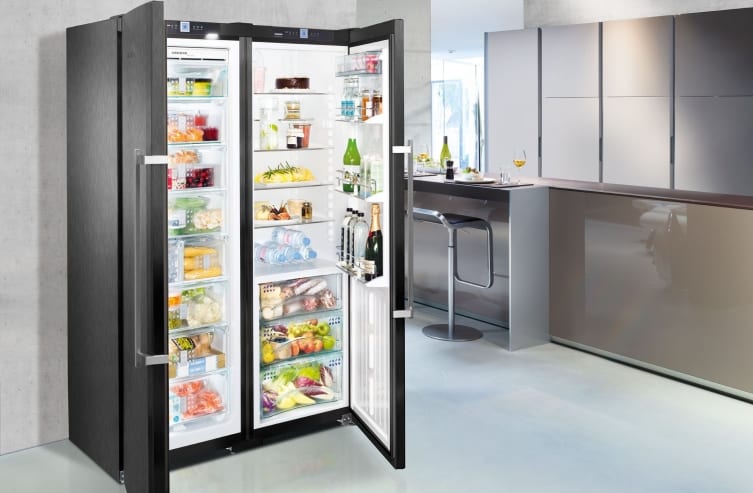We’ve all been there: the bags are packed and all the lights are off – now it’s time to lock the door behind us and the holiday can begin! But hang on, aren’t we forgetting something? Standby lights are glowing brightly, the oven clock shines out, the display on the coffee machine is beaming, and the refrigerator is humming quietly. And so, we pause to think: Leave it all on or switch it off? In this post we’ll help provide an answer to this dilemma.

The older the appliance, the more energy it consumes
It doesn’t always have to be the big ‘going away for a holiday’ that gets us thinking about energy consumption during our absence. In Ireland, homes and apartments are regularly empty at the weekend. Think of all the student digs that are regularly vacated for weekend trips home or end-of-term breaks. Some people rent out an apartment for work during the week and some have their own weekend getaway. We recently received a question via the comments section from one of our customers, Ms. Debus, who asked whether it was worthwhile switching off the refrigerator in her city apartment from Thursday evening until Sunday evening, when she’s back home for the weekend.
So, what should you be considering when you’re making your decision? Well, you need to be aware that the older your appliance, the more energy it consumes, particularly when compared with the same, latest generation device. Most people do not know how much power their old fridge actually eats up. You can test this yourself: just borrow an ammeter and check it out. It’s easy to do.
Example calculation
For comparison (approx. information): A typical A++, 150-litre refrigerator without a freezer compartment uses approximately 95 kWh of electricity per year. If you add in a freezer compartment, consumption jumps to about 140kWh/year. Meanwhile, an A++ rated combination fridge-freezer uses between 185 kWh and about 230 kWh, depending on its storage capacity.
But, in comparison, a Liebherr BluPerformance series combination fridge-freezer with an enormous storage capacity of 344L consumes only 149 kWh per year! These appliances undercut the A+++ energy rating by a further 20 per cent, so you can see the advantage of investing in a new appliance!
Now we need to think: How much does it cost me to run my fridge? The following calculation should help make refrigerator energy use a little clearer and easy to quantify: – Consider an A++ fridge with a freezer compartment and an annual consumption of 150 kWh – Electricity costs about €0.28 (about 24p) per kWh Cost calculation: 150 kWh x €0.28 = €42 per year or about €0.12 per day
So, that’s how we arrive at the cost of running a fridge. But, if you throw into the equation the fact that a fridge is rarely completely empty, and that food would have to be discarded if you switched off the fridge, the value of the food must also be factored in (quite apart from the fact that food shouldn’t be wasted if at all possible). This alone might well convince you to keep your fridge plugged in during your absence.
So does it ever make sense to switch off your fridge?
As you can see, the question of whether it makes sense for you to turn off an empty fridge comes down to whether you think saving €0.12 a day is worth it for you.
But, to answer Ms. Debus’ question specifically: for the average refrigerator, the compressor has to work for about 5 hours for the appliance to achieve its set operating temperature. Also, as a general rule of thumb, after a refrigerator has been idle for about half an hour, it will start the compressor again for 10 minutes. Jiggling with the sums here, this gives us the answer to our customer’s question: Yes, Ms. Debus, from an energy efficiency point of view alone, it is worth switching off your refrigerator from Thursday evening to Sunday evening. The rule of thumb here is as follows: it’s worth switching off an empty refrigerator (no freezer compartment), after about a day, and worth switching off an empty fridge-freezer after about a week.
If you do decide to switch off your fridge, make sure you leave the doors open to prevent mould or unpleasant odours developing. And, take a look at our article on how to properly clean a refrigerator
*(The basis for this example calculation is a household with two televisions, a DVD player, a compact stereo system, three radios, a PC with a monitor and printer, two mobile phone chargers, a landline phone, a small electric boiler, and a fridge-freezer in energy efficiency class A. If all these devices remain on standby or continue to operate normally during the two weeks, they consume approximately 36.75-kilowatt hours of power. Per household, this equates to about €7.35 in electricity (at about €0.20/kWh). These statistics are not fully up-to-date and, as almost everyone is aware, current electricity costs have gone up).
Did you find this post helpful? Please let us know using the comment form below. We would also appreciate it if you would recommend this post to others using the social media networks Facebook, Twitter or one of the other options in the list below. Thanks!